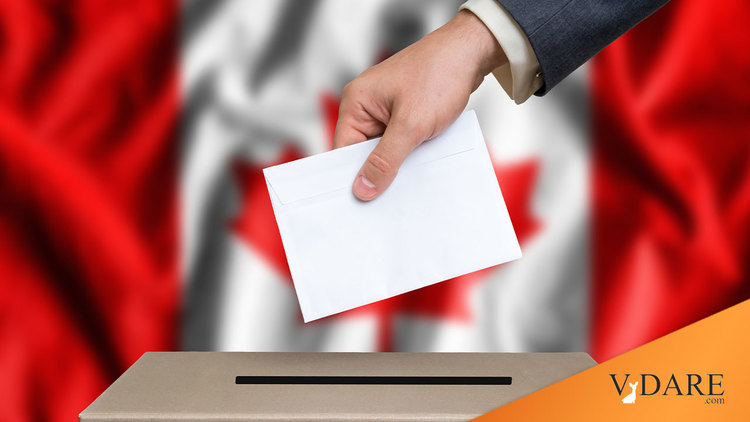
02/07/2006
Republished on VDARE.com on February 07, 2006
Wall Street Journal, Sep 14, 1984
Will Progressive Conservative Brian Mulroney’s victory in Canada’s recent elections prove as evanescent as the 1958 Tory electoral sweep? Most interpretations of Mr. Mulroney’s victory seem intent on preserving the dogma that Canada’s political culture is different, more "moderate" and collectivist, than that of the U.S. But in fact, English-speaking Canadians are pretty much like their neighbors in other sections of North America. They are certainly no more liberal than the inhabitants of the Upper Midwest or the Pacific Northwest.
The differences between the U.S. and Canada are more a result of institutions than ideology. It is Canada’s parliamentary system, with its ruthless party discipline and utter lack of regional balance, that has effectively suppressed a Reagan-style, Western-led conservative insurrection up to now. It is salutary to remember that if the U.S. had the parliamentary system, Tip O'Neill — because he controls the House of Representatives, which with equal-sized single-member districts most closely corresponds to the House of Commons — would now be the U.S. prime minister.
Rather than ideology, Canadian elections are about sectionalism and ethnicity. It is here that churlish questions must be asked about Mr. Mulroney’s victory. There is no doubt that he scored an impressive personal triumph in wooing French Canadians away from liberalism, increasing his party’s share of the French-speaking province of Quebec’s 75 seats to 58 from one. Of course, this was partly achieved by his remarkably frank promises to redistribute government patronage in Quebec — a feature of Mr. Mulroney’s campaign style.
More ominously, Mr. Mulroney attracted French votes because he is a native-born patois-speaking Quebecer and a semi-assimilated Irish Catholic — an ethnic group viewed as neutral to friendly in the ancestral wars against les Anglais. By contrast, Liberal John Turner’s Ontario base and Parisian French excited the socially acceptable racism that was exemplified by Devoir editor Lise Bisonette’s description of Mr. Turner as "a perfect WASP," although he is in fact a Roman Catholic. Yet the bulk of Mr. Mulroney’s Tory party is still unreconstructedly Anglophone and Protestant. Cultural clashes are inevitable in the new Tory caucus.
Cultural clashes within the Tory party are also likely because, notwithstanding the party’s commitment to federalism, a number of the new French Tory M.P.s, such as Rimouski’s Monique Vezina, are Quebec separatists. The separatist Parti Quebecois provincial government in Quebec, which won reelection in 1981, apparently decided to throw its weight behind the Tories to defeat its federal Liberal enemies. Tories have been an unknown species in large parts of Quebec, and the PQ seems to have provided organization and personnel. Who is fooling whom in this singular alliance is naturally a pressing question. Mr. Mulroney probably hopes to coopt separatists in his ranks, and has hinted that he may be prepared to cede to Quebec the veto over constitutional matters it was explicitly denied in the Liberals' 1981 constitutional reform. But this may not be acceptable to English Canada.
The inflexibilities of the parliamentary system will also make it difficult for Mr. Mulroney to alleviate the sectional stress in English Canada. For example, generally speaking, Western Canada would benefit from free trade with the U.S. Instead, under the Liberals it was treated as a colony in a fairly pure mercantilist sense, forced to buy tariff-protected goods from Ontario and Quebec and restricted in its ability to sell to foreign markets. Even the National Energy Program, whose anti-American provisions attracted attention here, was more accurately an attempt by Ottawa to expropriate Western energy profits and to direct domestic energy developments along politically favored lines.
But apart from the federal government’s chronic revenue needs, it is hard to see how Mr. Mulroney can radically alter a policy so patently designed to favor Ontario and Quebec, from which the majority of his caucus comes. Similarly, Mr. Mulroney is committed to leave unchanged the Liberals' policy of bilingualism, their panacea for Quebec separatism. This would effectively restrict key jobs in the federal government — Canada’s major employer — to the 15% of the population that is bilingual, most of whom are French Canadians and almost all of whom live in Quebec and Ontario. Yet Western resentment of bilingualism is intense. A nascent Western separatist party, the Confederation of Regions, has put up a surprisingly strong showing in Manitoba, where an attempt to impose the policy at a provincial level was withdrawn in the face of virtual public insurrection earlier this year.
Of course, the Tories' problems in trying to consolidate their gains must seem enviable to the shattered federal Liberals. Without any provincial Liberal governments to succor them, and without a leader who appeals to their traditional Quebec base, their comeback is going to be rough. Which raises a possibility unmentionable in Canada: The ultimate beneficiary of the Tory win may be the Parti Quebecois, which has succeeded in destroying its main rival for the affection of the French Canadians.
—
Mr. Brimelow writes for Barron’s and has been a columnist for the Financial Post and Maclean’s magazine. He is finishing a book on Canada for the Manhattan Institute.
This is a content archive of VDARE.com, which Letitia James forced off of the Internet using lawfare.